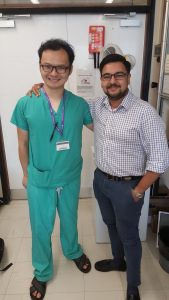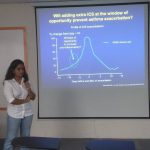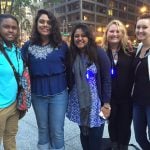An IMU alumnus, Tan Tze Khiang, who is currently pursuing his final year of medicine in the University of Dundee managed to secure a research project in Nuffield Department of Surgical Sciences, University of Oxford. The research project focused on newly invented medical software from the United States of America (USA) called Stone Checker. Tze Khiang relates his experience here. The software is designed to aid clinical decision making by providing information about a patient’s kidney stone. Traditionally, we manually measure the size of the kidney stone using single slice of CT scan with the largest diameter to determine the type of treatment which lack accuracy and reliability. However, with this software it can analyse the consecutive image slices of the same stone and produces summary statistics of the whole stone which includes the whole stone volume and stone architecture. As this software is new and I did not have any exposure on this area, I decide to take up this opportunity to gain further insight on this field. Furthermore, this research experience allows me to test the reliability of this particular software.
 Initially, I did not expect to have the opportunity to carry out research project in University of Oxford. I was fortunate to encounter someone who willingly offered me some help in making contacts in Nuffield Department of Surgical Sciences which eventually granted me the opportunity to be part of the research team in the department. I was initially rejected by some other supervisors in the department as they do not usually take in undergraduate students to be part of the research team. It took me quite some time until I made contact with Miss Cui who is also one of the researcher in the department, we later had a telephone conversation to have a chat about my research experience and the aim of the project that was going to happen in Oxford. My entire research timeline in Oxford was hectic, I had to come up with a proper planning in the beginning and spent majority of the time on the software tool to analyse all the research sample in order to yield good results. Furthermore, my supervisors in Oxford were willing to allow me to present the research work at the conference held at Keble College, Oxford.
Initially, I did not expect to have the opportunity to carry out research project in University of Oxford. I was fortunate to encounter someone who willingly offered me some help in making contacts in Nuffield Department of Surgical Sciences which eventually granted me the opportunity to be part of the research team in the department. I was initially rejected by some other supervisors in the department as they do not usually take in undergraduate students to be part of the research team. It took me quite some time until I made contact with Miss Cui who is also one of the researcher in the department, we later had a telephone conversation to have a chat about my research experience and the aim of the project that was going to happen in Oxford. My entire research timeline in Oxford was hectic, I had to come up with a proper planning in the beginning and spent majority of the time on the software tool to analyse all the research sample in order to yield good results. Furthermore, my supervisors in Oxford were willing to allow me to present the research work at the conference held at Keble College, Oxford.  It was a great experience to have an exposure of research in University of Oxford. In Oxford, there is a huge variety of research facilities and knowledgeable people who are willing to provide realistic guidance on research field. When I was carrying out the research project in the Nuffield Department of Surgical Sciences, there was no other medical student around. I had to go around seeking help from various supervisors in the beginning which was time consuming as I was not familiar to the system that is running in the department. I am extremely grateful to all my friends and supervisors who lend me their helping hands during the time where I was having multiple questions and difficult times in research field. I can recall vividly how I started my first research project back in Ninewells Hospital, Dundee and what were the obstacles encountered and mistakes made. However, as I was actively involved in various research projects and audits, I realised that errors and obstacles are unavoidable, but the most important thing is how you handle these problems and turn them into your stepping stones to reach something bigger.
It was a great experience to have an exposure of research in University of Oxford. In Oxford, there is a huge variety of research facilities and knowledgeable people who are willing to provide realistic guidance on research field. When I was carrying out the research project in the Nuffield Department of Surgical Sciences, there was no other medical student around. I had to go around seeking help from various supervisors in the beginning which was time consuming as I was not familiar to the system that is running in the department. I am extremely grateful to all my friends and supervisors who lend me their helping hands during the time where I was having multiple questions and difficult times in research field. I can recall vividly how I started my first research project back in Ninewells Hospital, Dundee and what were the obstacles encountered and mistakes made. However, as I was actively involved in various research projects and audits, I realised that errors and obstacles are unavoidable, but the most important thing is how you handle these problems and turn them into your stepping stones to reach something bigger.  Moreover, this would not have been achievable without the research opportunities and skills provided by all the supervisors I worked with in Dundee. Due to their warm hospitality to involve students as part of the research team, I was able to acquire all the basic skills in the research field which will guide me as I proceed to Foundation Year and Specialty Training Programme. It is always beneficial to have early exposure in the research field while we are still in medical school. This allows us to keep us up to date with the research project that is happening around us. Especially in the UK, there are many opportunities in the medical school or hospital. Plus, you will be given the opportunity to present your work at the national or international conference which will be very helpful when you apply for specialty training programme in the future. Besides, if the research project is successful, meaning significant results, you will stand a higher chance of publishing your work. As I am reaching the end of medical school, I came to the point of realisation that we must know what we actually want and set up a realistic plan to figure out the way to get everything we want in our life. Furthermore, always be prepared to account for variable changes, because these changes might, sometime, lead us to something bigger. Situations are often difficult when we start something new and the best way to make the best of out of the experience is to train your brain to adopt a different mindset to approach the issue.
Moreover, this would not have been achievable without the research opportunities and skills provided by all the supervisors I worked with in Dundee. Due to their warm hospitality to involve students as part of the research team, I was able to acquire all the basic skills in the research field which will guide me as I proceed to Foundation Year and Specialty Training Programme. It is always beneficial to have early exposure in the research field while we are still in medical school. This allows us to keep us up to date with the research project that is happening around us. Especially in the UK, there are many opportunities in the medical school or hospital. Plus, you will be given the opportunity to present your work at the national or international conference which will be very helpful when you apply for specialty training programme in the future. Besides, if the research project is successful, meaning significant results, you will stand a higher chance of publishing your work. As I am reaching the end of medical school, I came to the point of realisation that we must know what we actually want and set up a realistic plan to figure out the way to get everything we want in our life. Furthermore, always be prepared to account for variable changes, because these changes might, sometime, lead us to something bigger. Situations are often difficult when we start something new and the best way to make the best of out of the experience is to train your brain to adopt a different mindset to approach the issue.

| Note: |
|---|
| Tze Khiang started his studies in medicine at the International Medical University in Malaysia in 2014 and transferred to University of Dundee, UK for completion of his degree in 2016 He is expected to complete his degree in 2019. |












